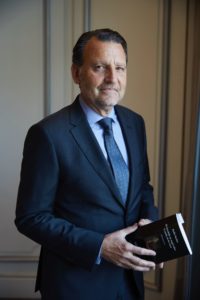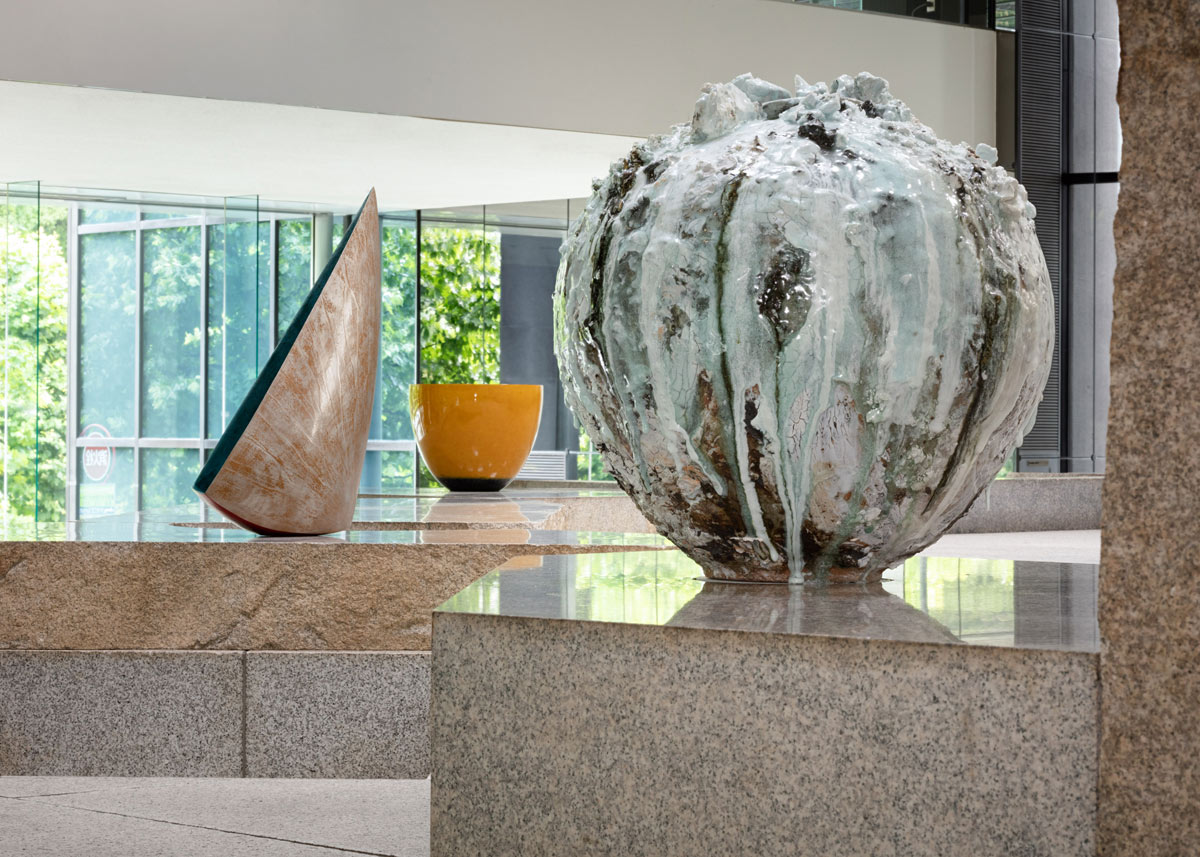 Basilio Sánchez (Cáceres, Spain – 1958), winner of the 31st LOEWE Foundation International Poetry Prize, lived the award ceremony with “a feeling that no one wanted it to end; there was a widespread sense of kindness that made me feel cared for, protected, and even loved,” he explains. The poet, who has ten published books under his belt, believes he received the Prize at the pinnacle of his career as a poet, “when what I had been writing had reached its highest point of refinement. I believed I’d done a good job with He heredado un nogal sobre la tumba de los reyes, that it had come together well and that, because it was untitled, it was a sort of meditative book; as if one were speaking exclusively to oneself without needing raise one’s voice or convince anyone of anything,” he says.
Basilio Sánchez (Cáceres, Spain – 1958), winner of the 31st LOEWE Foundation International Poetry Prize, lived the award ceremony with “a feeling that no one wanted it to end; there was a widespread sense of kindness that made me feel cared for, protected, and even loved,” he explains. The poet, who has ten published books under his belt, believes he received the Prize at the pinnacle of his career as a poet, “when what I had been writing had reached its highest point of refinement. I believed I’d done a good job with He heredado un nogal sobre la tumba de los reyes, that it had come together well and that, because it was untitled, it was a sort of meditative book; as if one were speaking exclusively to oneself without needing raise one’s voice or convince anyone of anything,” he says.
Representing the type of whispered poetry that sits outside of today’s most common platforms, Basilio Sánchez has celebrated the Prize both for him and for what his writing represents. He explains that “the poetry one hears today is young poetry; the type that virtual bookstores promote in their window displays. At a time when the immediacy and transience of ‘disposable’ poetry predominates -when one writes something one day, posts it the following day, and then the next day receives several thousand ‘likes’- rewarding a book of poetry written methodically, over time, using pencil and paper; a book that is based on years of experience… I quite like that, because it’s the best way to vindicate the type of writing I believe in.” A poetry, he adds, that is “grounded, slow, written to last, and not to survive on social networks.” The recognition of his book, he insists, “vindicates a huge group of poets I admire greatly, whose work I have read over the years, who are my age and who have been writing silently, outside of the networks”. His poetry, he explains, “drinks from tradition, without erasing or rejecting it. It feeds off of it and respectfully tries to find its own path.”

Flattered by the fact that his literary role-models have considered his book worthy of this Price, he remembers the relevance of its Jury. “I read their poetry when I started writing and now, to see them sitting there, reading my book … and, what’s more, liking it!” he says with self-admiration and humour. He specifically names Jaime Siles, Caballero Bonald, Francisco Brines, Antonio Colinas and De Villena. “Víctor García de la Concha – President of the Jury- was a prominent literary critic when I started out; we all wished for him to review our books,” he adds. Come next edition, Sánchez will be one the Jury members. “It will be tough, but I will dedicate the same effort to judging than to writing; it is a huge responsibility because the prestige of both the Prize and the Jury is at stake…and because we are entrusted with choosing a worthy book,” he says stressing that it must “be a book that truly rises above the others, regardless of affinities or fashions, because there are, in fact, certain elements that give the work value.” Basilio Sánchez considers himself “a worker of poetry; not just of poetry itself but of all aspects of writing: the pencil and paper, the cover of the book, the publishing house, the readings. The winner, who is actually an M.D., recognizes the “correlation” between both activities: “Over the years I’ve discovered that the doctor I am has improved a lot thanks to poetry, but the poet has also been nourished by medicine.” However, he acknowledges, his desire is “to be a good doctor in medicine and a good poet in writing; if not, it would be suspicious. ”

In keeping with the tradition of being silent for at least a year after he finishes a book, Sánchez finds himself in that period of “apparent sterility that is actually not sterile at all, because it’s the time to emotionally recharge one’s batteries through life experiences that will emerge when the writing process begins again.” It is about resting the mind to “enjoy reading,” he says. “A pleasure almost greater than writing.”
El furtivo que merodea en la noche
se siente vigilado
desde un bosque de estrellas.
Soy una muchedumbre que camina en secreto.
Soy un pueblo a la orilla
de este mar incesante
que construye sus torres sobre las ruinas de sus aguas.
Basilio Sánchez
2018 LOEWE Prize
He heredado un nogal sobre la tumba de los reyes
Photo Captions: Basilio Sánchez at the 31st Award Ceremony of the LOEWE Foundation International Poetry Prize. Poetry reading at the Instituto Cervantes in Madrid with Luis García Montero. Interview for ‘La hora cultural’, TVE 24 horas © Álvaro Tomé for the LOEWE Foundation, 2019.










 Basilio Sánchez (Cáceres, Spain – 1958), winner of the 31st LOEWE Foundation International Poetry Prize, lived the award ceremony with “a feeling that no one wanted it to end; there was a widespread sense of kindness that made me feel cared for, protected, and even loved,” he explains. The poet, who has ten published books under his belt, believes he received the Prize at the pinnacle of his career as a poet, “when what I had been writing had reached its highest point of refinement. I believed I’d done a good job with He heredado un nogal sobre la tumba de los reyes, that it had come together well and that, because it was untitled, it was a sort of meditative book; as if one were speaking exclusively to oneself without needing raise one’s voice or convince anyone of anything,” he says.
Basilio Sánchez (Cáceres, Spain – 1958), winner of the 31st LOEWE Foundation International Poetry Prize, lived the award ceremony with “a feeling that no one wanted it to end; there was a widespread sense of kindness that made me feel cared for, protected, and even loved,” he explains. The poet, who has ten published books under his belt, believes he received the Prize at the pinnacle of his career as a poet, “when what I had been writing had reached its highest point of refinement. I believed I’d done a good job with He heredado un nogal sobre la tumba de los reyes, that it had come together well and that, because it was untitled, it was a sort of meditative book; as if one were speaking exclusively to oneself without needing raise one’s voice or convince anyone of anything,” he says.



 Basilio Sánchez thanked Colinas for “the attentive and extremely generous reading” of his poems and the Jury –among whom, he said, many of his literary role models are to be found– for having awarded him with a Prize that he doesn’t want to consider “a recognition of quality or of the more or less fortunate verses within, but rather, of the spirit that spurs it, the humanistic style that drives it, that passionate confidence with which it seeks to overcome the exhaustion and disappointment that are so rampant today”. He applauded the LOEWE Foundation’s effort to “promote and preserve this important literary contest that is capable of generating, amidst the confusion and uncertainty of our time, a moral space for poetry, the humblest but also the most necessary of the manifestations of the soul”. He thanked everyone in attendance, his friends and family, and in particular, his wife and children, to whom the book is dedicated. Sanchez then spoke of the painting –by Basilio’s own father– that illustrates the book’s cover, explaining its relationship to the verses. “It’s a meditative book”, he added, “but also the field book of a naturalist who sees words as his raison d’être and who uses both poetry and the images words can conjure to question the world and how he interacts with it. These are verses written by someone who knows there is nothing more beautiful than allowing the night to convince you that everything is eternal”.
Basilio Sánchez thanked Colinas for “the attentive and extremely generous reading” of his poems and the Jury –among whom, he said, many of his literary role models are to be found– for having awarded him with a Prize that he doesn’t want to consider “a recognition of quality or of the more or less fortunate verses within, but rather, of the spirit that spurs it, the humanistic style that drives it, that passionate confidence with which it seeks to overcome the exhaustion and disappointment that are so rampant today”. He applauded the LOEWE Foundation’s effort to “promote and preserve this important literary contest that is capable of generating, amidst the confusion and uncertainty of our time, a moral space for poetry, the humblest but also the most necessary of the manifestations of the soul”. He thanked everyone in attendance, his friends and family, and in particular, his wife and children, to whom the book is dedicated. Sanchez then spoke of the painting –by Basilio’s own father– that illustrates the book’s cover, explaining its relationship to the verses. “It’s a meditative book”, he added, “but also the field book of a naturalist who sees words as his raison d’être and who uses both poetry and the images words can conjure to question the world and how he interacts with it. These are verses written by someone who knows there is nothing more beautiful than allowing the night to convince you that everything is eternal”.





